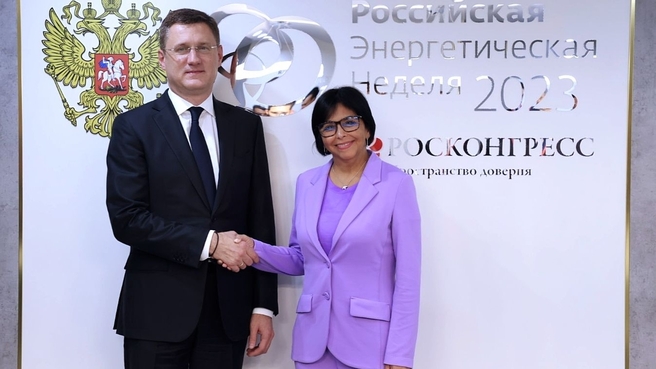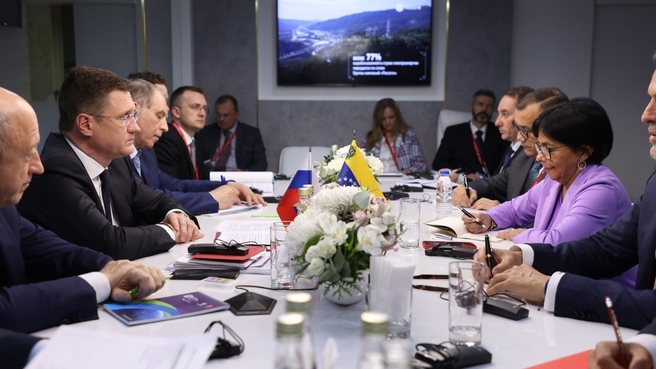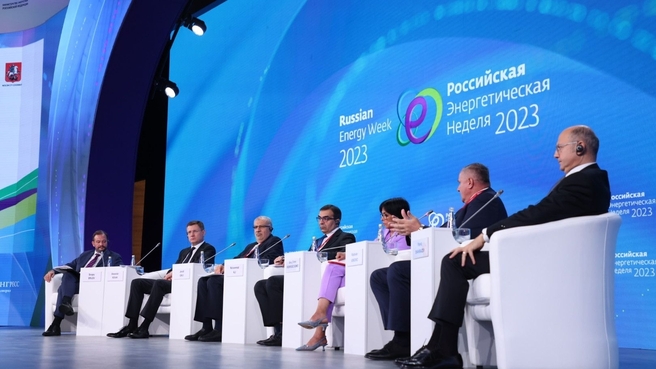
Alexander Novak takes part in the plenary session, The Global Oil and Gas Market: Navigating a Period of Turbulence, on the sidelines of the Russian Energy Week international forum
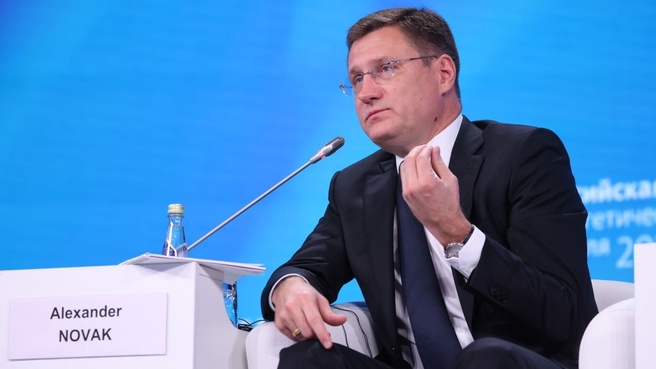
Alexander Novak takes part in the plenary session, The Global Oil and Gas Market: Navigating a Period of Turbulence, on the sidelines of the Russian Energy Week international forum
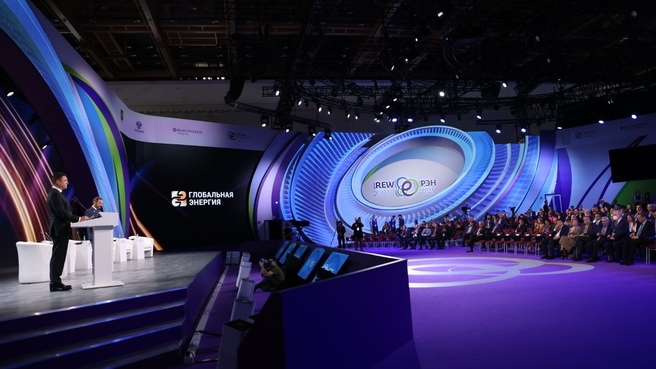
Alexander Novak presents awards to winners of the Global Energy Prize as part of a panel discussion on the sidelines of the Russian Energy Week international forum
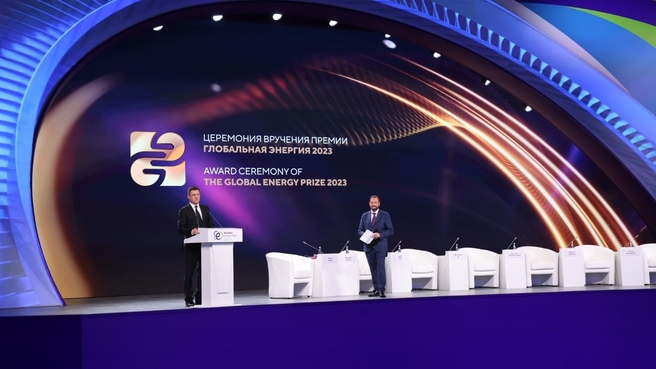
Alexander Novak presents awards to winners of the Global Energy Prize as part of a panel discussion on the sidelines of the Russian Energy Week international forum
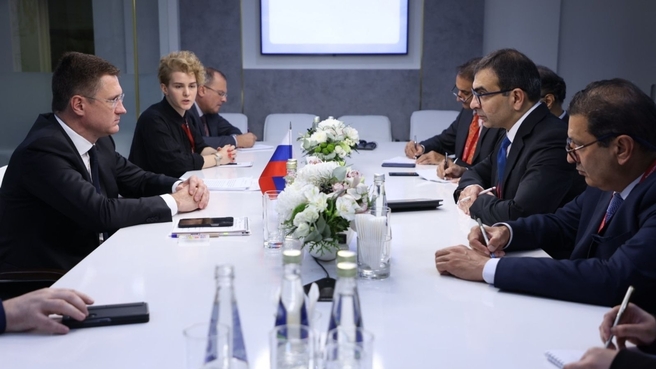
Alexander Novak has talks with the Interim Federal Minister of Energy of the Islamic Republic of Pakistan Muhammad Ali on the sidelines of the Russian Energy Week international forum
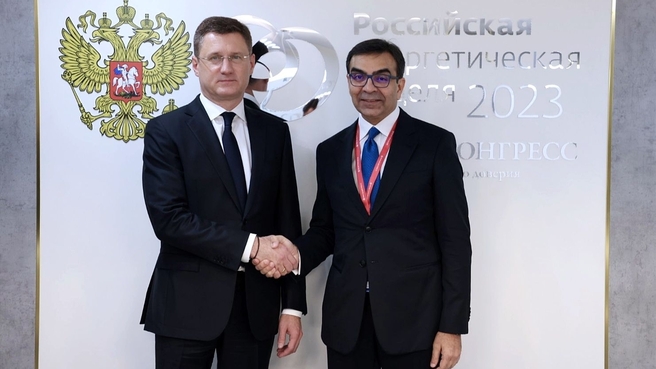
Alexander Novak has talks with the Interim Federal Minister of Energy of the Islamic Republic of Pakistan Muhammad Ali on the sidelines of the Russian Energy Week international forum
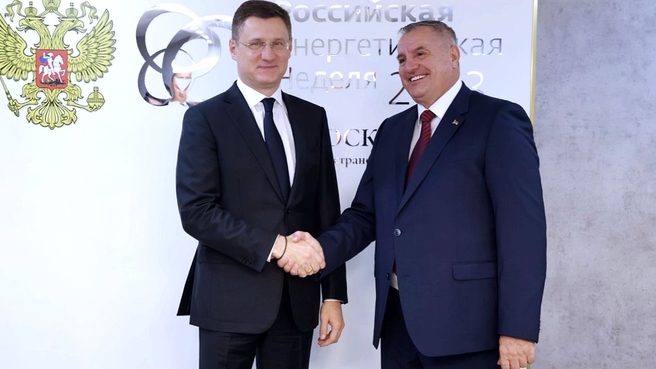
Alexander Novak has talks with Prime Minister of Republika Srpska in Bosnia and Herzegovina Radovan Viskovic on the sidelines of the Russian Energy Week international forum
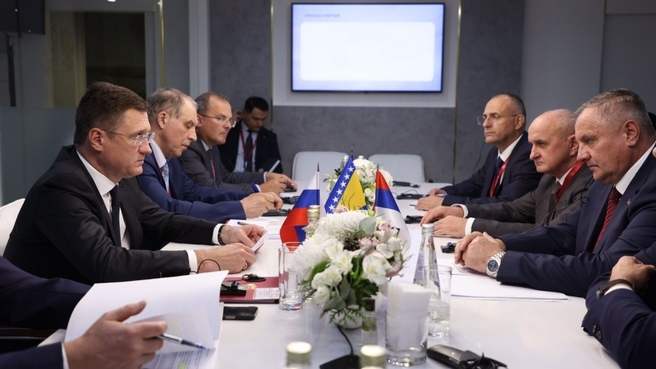
Alexander Novak has talks with Prime Minister of Republika Srpska in Bosnia and Herzegovina Radovan Viskovic on the sidelines of the Russian Energy Week international forum
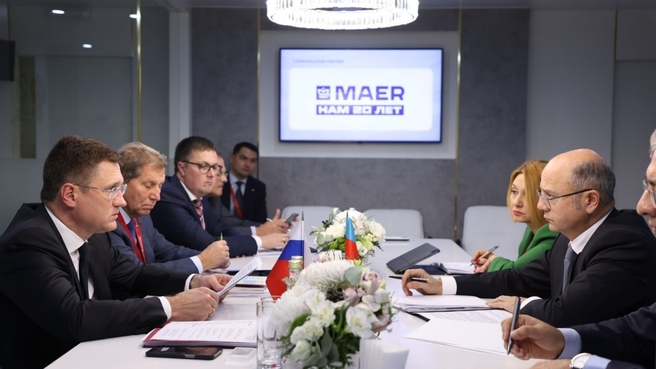
Alexander Novak has talks with Minister of Energy of the Republic of Azerbaijan Parviz Shahbazov on the sidelines of the Russian Energy Week international forum
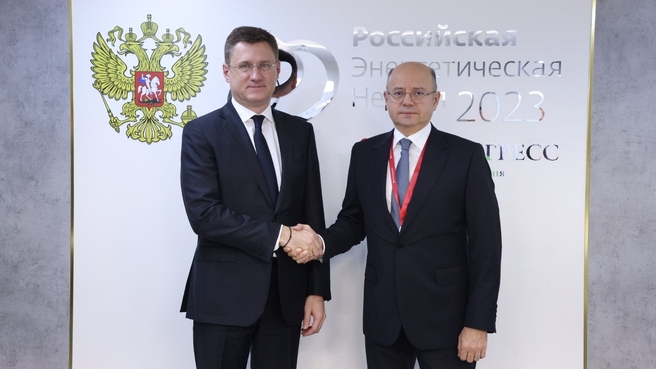
Alexander Novak has talks with Minister of Energy of the Republic of Azerbaijan Parviz Shahbazov on the sidelines of the Russian Energy Week international forum
Alexander Novak takes part in the plenary session, The Global Oil and Gas Market: Navigating a Period of Turbulence, on the sidelines of the Russian Energy Week international forum
Deputy Prime Minister Alexander Novak delivered remarks on the sidelines of the plenary session of the Russian Energy Week international forum, presented awards to the winners of the Global Energy Prize, held talks with foreign partners, and gave interviews to Russian and foreign media.
In his remarks at the plenary session, The Global Oil and Gas Market: Navigating a Period of Turbulence, the Deputy Prime Minister spoke about the current situation in the oil market and the impact of sanctions. The session was also attended by Pakistani Interim Federal Energy Minister Muhammad Ali, Republika Srpska’s Prime Minister Radovan Viskovic, Iranian Oil Minister Javad Ouji, Venezuela’s Executive Vice President Delcy Rodriguez and Azerbaijani Energy Minister Parviz Shahbazov.
“The sanctions policy is designed to restrict economic growth in the countries that the United States finds objectionable,” Alexander Novak said. “To an extent, this is damaging, but our countries use it to gain additional opportunities and promote growth. Even when it comes to redirecting oil and gas flows, whatever happens happens for the best. Today, our focus is on the Asia-Pacific region, and we are developing the associated infrastructure and friendly relations. We see that this region will consume the bulk of energy resources going forward. In one way or another, we dealt with this before as well. “Our decisions regarding the trunk pipeline infrastructure and the LNG capacity simply received a slight boost.”
According to Delcy Rodriguez, the United States has imposed at least 930 sanctions on Venezuela. “The sanctions system amounts to blackmail and extortion, and is designed to bury Venezuela's economy and its political course. Venezuela has lost about 4 billion barrels of oil resulting in a loss of over $600 billion in revenue. Furthermore, sanctions have impacted the development of the entire Caribbean region,” she said. Delcy Rodriguez agreed that the sanctions provided a motivation to Russia and an opportunity to redirect its resources to other markets despite the difficulties that it had to overcome.
Panel session participants noted that challenges in mutual trade-related settlements can be overcome by achieving independence from the currencies and financial systems of unfriendly countries. “There are issues with mutual settlements and a discussion about which currency can replace the dollar. My opinion is that we can move towards digital payments using blockchain technology, and we will then need no world currency. This is a completely different approach. To achieve this, we need to unite and work together, including as part of the BRICS association, which is expanding. The BRICS economy, after the addition of six more countries, will surpass the economies of the countries that are imposing restrictions on us,” Alexander Novak said.
During the panel discussion, Alexander Novak presented the Global Energy award in the Unconventional Energy category to Chinese researcher Zhong Lin Wang, the founder and director of the Beijing Institute of Nanoenergy and Nanosystems, and Ruzhu Wang, professor at Shanghai University of Transport, in the New Energy Applications category.
“The rapid growth in demand for electricity is among the key global energy trends. The electrification of transport, widespread use of mobile devices, and increased access to electric power grids in developing countries is increasing demand for innovations that simplify manufacturing processes and increases the efficiency of electric and thermal energy consumption. In this regard, the winners’ work is at the forefront of global trends,” Alexander Novak said.
In 2023, scientists from 48 countries submitted applications for the award, marking a fourfold increase compared to three years ago.
During the forum, Alexander Novak met with Prime Minister of the Republic of Srpska in Bosnia and Herzegovina, Radovan Viskovic, the Minister of Energy of the Republic of Azerbaijan, Parviz Shahbazov, the Executive Vice President of Venezuela, Delcy Rodriguez, and the interim Federal Minister of Energy of the Islamic Republic of Pakistan, Muhammad Ali.
During a bilateral meeting with Radovan Viskovic, Alexander Novak discussed cooperation in the oil and energy sectors, as well as terms for the operation of the Brod oil refinery with Russia’s participation and options of expanding its capacity.
According to Alexander Novak, the parties are considering signing a long-term contract for the supply of Russian gas to the republic and increasing volumes to meet the needs of the new generation.
During the meeting with the Minister of Energy of the Republic of Azerbaijan, Parviz Shahbazov, the parties discussed expanding cooperation between the two countries in the oil and gas, electric power, and nuclear sectors. The agenda included the possibility of expanding the Tikhoretsk-Baku oil pipeline for reverse deliveries of Russian oil to Azerbaijan and the prospects of establishing technology cooperation between Russian and Azerbaijani companies within the framework of import substitution policies.
Speaking with Delcy Rodriguez, Alexander Novak expressed gratitude for her support of Russia's position in the political sphere. The parties discussed interaction in oil and gas projects in the republic and preparations for President of Venezuela Nicolas Maduro’s visit to Russia.
Alexander Novak also held a bilateral meeting with the Minister of Energy of Pakistan, where they discussed expanding cooperation between the two countries in the field of energy and the fuel and energy complex.
The Deputy Prime Minister gave interviews to several Russian and international television channels.
